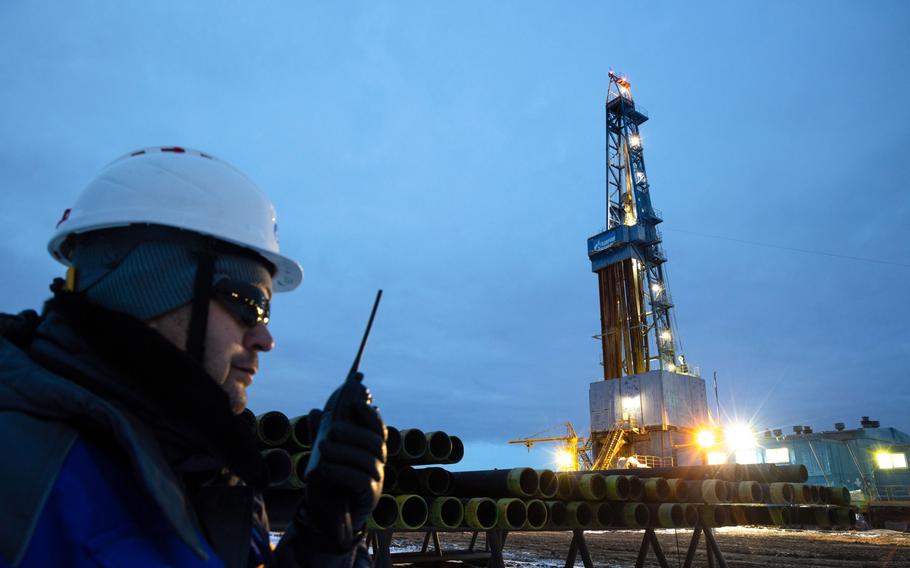
Lights illuminate a gas drilling rig on the Gazprom Chayandinskoye oil, gas and condensate field, a resource base for the Power of Siberia gas pipeline, in the Lensk district of the Sakha Republic, Russia, on Oct. 13, 2021. MUST CREDIT: Bloomberg photo by Andrey Rudakov. (Andrey Rudakov/Bloomberg)
Russia forged new long-term supply deals with China as the Kremlin aims to strengthen ties with the Asian nation amid souring relations with the West.
Energy giants Gazprom and Rosneft signed agreements with the world’s largest energy consumer as President Vladimir Putin met his Chinese counterpart Xi Jinping in Beijing ahead of the Winter Olympics. The two leaders are drawing their nations closer together, united by political, military and economic frictions with Europe and the U.S.
“Friendship between the two states has no limits, there are no ‘forbidden’ areas of cooperation,” the Kremlin said in a statement following the meeting.
Russia’s relationships with western nations have deteriorated significantly in the past year over concerns Moscow may attack neighboring Ukraine, something the Kremlin insists it isn’t planning to do. The U.S. and Europe are considering sanctioning Russian energy and metals projects, as well as banks and sovereign debt, if there’s a military invasion.
After gas prices in Europe hit record levels, traders have been following the flow of Russia’s energy exports closely. Gazprom’s westbound deliveries have been capped all winter, deepening concerns about scarce supplies even as the company said it is meeting all requests from long-term clients in full.
The standoff over Ukraine has amplified concerns that Russian gas deliveries could be cut off, either intentionally or as a result of military attacks. While the Kremlin has repeatedly said it will remain a reliable energy supplier, tensions with the West are motivating an acceleration of the country’s so-called “Pivot to Asia” that began last decade with multi-billion oil and gas supply deals.
During Putin’s visit to Beijing, Gazprom signed its second long-term gas deal with China National Petroleum Corp. Under the agreement, the producer will deliver 10 billion cubic meters per year over 25 years via a new pipeline from Russia’s Far East.
“Delivering gas to China’s northeastern tip makes this project strategically attractive for China, as the only real alternative supply would be more expensive liquefied natural gas,” BCS Global Markets analyst Ron Smith said in an emailed note following the agreement.
The deal also has a strategic importance for Gazprom, which expects gas demand in China to grow by almost 50% to 2030 as consumption in Europe, currently its largest market, shrinks by more than 5%.
In its statement, Gazprom did not specify which fields will provide gas for the Far Eastern route. Previously it has said reserves from the offshore South-Kirinskoye field in the Pacific could be the feedstock. Currently under the U.S. sanctions, the field is set to start commercial gas production from 2023. Gazprom earlier said the project’s output would plateau at 21 billion cubic meters per year.
Combined with deliveries via the Power of Siberia route, total contracted Russian gas flows to China are now set to peak at 48 billion cubic meters per year. Last year, Gazprom shipped about 11 billion cubic meters to the Asian nation via the Power of Siberia, according to Renaissance Capital estimates.
Gazprom is currently in talks with China over supplies via a third route, the so-called Power of Siberia 2, which would add yet another 50 billion cubic meters per year to Russia’s eastbound gas exports. “Given its size, negotiations for Power of Siberia 2 may take a while yet, but a conclusion could be reached in the course of 2022,” BCS’s Smith said. The link delivering fuel could give Gazprom new strategic options by allowing it to redirect gas from its core production region of West Sibera between clients in Europe and Asia, he said.
Rosneft reached an agreement to deliver 100 million tons of crude oil to CNPC via Kazakhstan within 10 years, following the expiration of a similar contract next year. The volumes will be used as feedstock for refineries in China’s north-west, Rosneft said in a statement.
In 2020, eastbound deliveries accounted for over a half of Rosneft’s total crude-oil exports, according to the company’s annual report.
- - -
Bloomberg’s Nariman Gizitdinov contributed to this report.